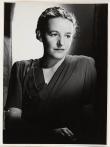Dymphna Cusack was a courageous social reformer in mid-twentieth century Australia and an activist for world peace from 1949 until her death in 1981. Her books and plays dealt with the dominant political issues of the times as they were refracted through the lives of ordinary people.
A 1925 Sydney University Arts graduate with honours in History and the new discipline of Psychology, Cusack taught in high schools across NSW for almost two decades. In 1936 she was appointed one of the first Vocational Guidance Counsellors at Sydney Girls' High School; from 1928 her plays (and poems) won prizes and were broadcast on radio; her first novel Jungfrau was published in 1936. Her "tall poppy" status inevitably brought detractors and in December 1939, following her victory in a groundbreaking Workers' Compensation case against the NSW Department of Education, Cusack was transferred to a supernumerary position at Bathurst High School. Her collaborator (Pioneers on Parade, 1939) and mentor Miles Franklin advised her to look at it as "a grand chance to turn the tables", which she did with her classic female staff-room bitchiness play Morning Sacrifice.
In 1944 Cusack's fragile health collapsed and she was pensioned out of the Education Department. She retreated to the Blue Mountains with her friend of undergraduate days, Florence James, visiting home after a decade in Europe. They did a test-run collaboration with a children's book before launching into their expose of Sydney during WWII, the thousand pound prizewinning novel Come In Spinner. In 1947 James returned to London; Cusack revised the manuscript, extracted the prize-money from the Daily Telegraph and in June 1949 departed for Europe. That September financial journalist and leading CPA member Norman Freehill joined her in London and they began a peripatetic lifestyle, writing, publishing and living on their royalties in England, France, Asia and Eastern Europe.
In 1954 Cusack's anti-bomb play Pacific Paradise caught the zeitgeist and was played internationally. In 1956 it took them to China where Freehill ran the Foreign Languages Press in Peking for three years. They returned to Australia to live in 1972 and in 1973 Cusack was awarded a life literary pension. In 1975 she founded the Manly branch of the Fellowship of Australian Writers. The autobiographical travelogue Dymphna by Norman Freehill with Dymphna Cusack was published in 1976, the same year Cusack refused an OBE. Increasingly disabled with multiple sclerosis symptoms she continued to travel to Asia and the Pacific, and to South America in 1980.
Manning Clark wrote to Cusack on 23 June 1980: "I hope by now a whole host of people has told you of their debt to you. I am one of your debtors, and you can think of the work in Australian History as being in part the product of your example." Cusack was awarded the Order of Australia just prior to her death on 19 October 1981.
 5567325915941918841.jpg
5567325915941918841.jpg